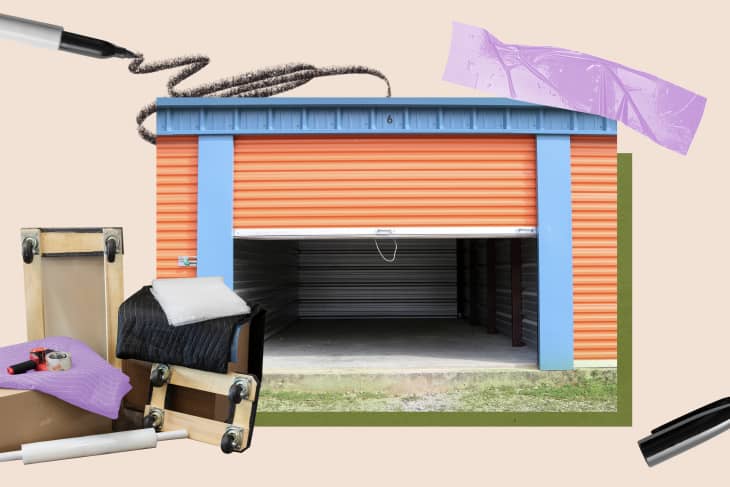It Feels Like Everyone You Know Has a Storage Unit, Doesn’t It?

In the past three years, you’ve probably cleaned out your closet, decluttered your house, or done some other variation of sparking joy à la Marie Kondo. Unsurprisingly, the trend towards minimalism has meant a surge in donations to local thrift stores and an accompanying minimalist aesthetic characterized by tones of beige and gray.
But here’s the thing: Americans love stuff. Even in the midst of minimalism’s reign, the “self-storage industry” is still expanding. According to a new survey released by StorageCafe, one in five Americans now have a storage unit, and in cities like Houston, Texas, searches for storage units have increased a whopping 218 percent since 2019. And while this increase is happening in tandem with shrinking apartment sizes, it’s not a perfect causal relationship — stuff, of course, is way more complicated than that.
It used to be that storage units were mainly for cramming old stuff around the house and yard (think: suburban homeowner excess in the form of clunky countertop appliances and holiday decorations). Then there’s the kind of unit depicted on the reality TV show “Storage Wars,” where pickers bid on abandoned units filled with forgotten possessions.
But in recent years, a more mobile generation is on the move, with one study citing that 59 percent of 18- to 35-year-olds live somewhere other than their hometown. Pair that with a widespread inability to buy property, and storage units are where young renters’ stuff ends up.
When I polled my own internet community about their relationship to storage units, the comments came flooding in. A storage unit isn’t just a practical solution to an overflowing apartment; it’s an archive of an old relationship, or a lost loved one, or a future that hasn’t yet come to fruition — like, say, a bigger apartment or a move to a new neighborhood. Unpacking a storage unit inevitably means unpacking a whole lot of emotions, too. It stands to reason, then, that with so much meaning imbued in people’s belongings, it’s always going to be hard to get rid of them.
Storage units aren’t always about the past; sometimes they’re about hope for the future. Planning her return to Brooklyn in the fall, Elise Laporte got a unit in Bushwick when she realized she could not afford to stay in New York for the summer. “I’m sad to not have a home base right now. Putting all of my things into storage was not my first choice. It felt like a necessity. Everything feels very uncertain, up in the air, in transition.”
Lily Sullivan, who pens the newsletter Love and Other Rugs, thinks of storage units like exes: “We’re all just trying to fit things into our lives — and we’re all just trying to find the perfect couch, man, rug, whatever,” she says. “The art of swiping on apps and the art of swiping on Facebook Marketplace is actually the same emotion.”
Sullivan’s relationship with storage units began in earnest when her mother passed away in 2017. She moved out of her Bushwick apartment, putting her life in NYC on hold and stashing her own possessions in a storage unit. She then moved home, got rid of three dumpsters’ worth of her mother’s stuff and put the rest — 20 storage bins — in storage.
“The more stuff we have, the more safe we feel. But then what it does is it weighs your ankles,” Sullivan says. “That’s the downfall with attaching ourselves to objects — ultimately, we are burdened by them.”
That burden is the reason, I suspect, that many of my peers are on a quest to relieve themselves of their storage unit, even as it becomes more and more common to have one. Rachel Albright, who moved to Mexico City from New York City in 2019, is ready to let hers go.
“At first, it was a safety net — I was moving to a different country where I didn’t know anyone, I had no place to live, I didn’t know what the future held or what I wanted for my life,” she says. “Now, it feels like it’s holding me back. I’ve moved on and I’ve made a life for myself here, but I’ve got this room filled with the old New York version of me and all its artifacts just sitting there taunting me. Soon, I’ll retrieve the final important and sentimental pieces of my life and get rid of the rest — you’d be surprised how little you care about the ‘things’ after not seeing them for almost two years.”
These anecdotes paint a picture of storage units that feels almost painfully personal, but that’s not always the case. MI Leggett, founder of the brand Official Rebrand, actually inherited the contents of a storage unit when an acquaintance left it all behind (it’s a bit of a long story). They’ve spent the last three years upcycling the inventory.
“It has opened up so many possibilities for me but it also feels like it weighs me down,” Leggett says. “I feel like I have the existential crisis of dealing with one’s own stuff, and now I also have the crisis of dealing with someone else’s unwanted stuff. But I want to save it all, even though some of it can’t necessarily be saved in a way that makes financial sense. That’s a constant problem with upcycling.”
If storage units contain the stories of past (and future) lives, then perhaps they’re worth more than we give them credit for. Brands, exes, apartments, and artifacts all come and go by way of the storage unit. In the end, it’s like Sullivan says: “They’re a crash pad — the ultimate grandma’s basement when you don’t have a grandma who lives in town.”